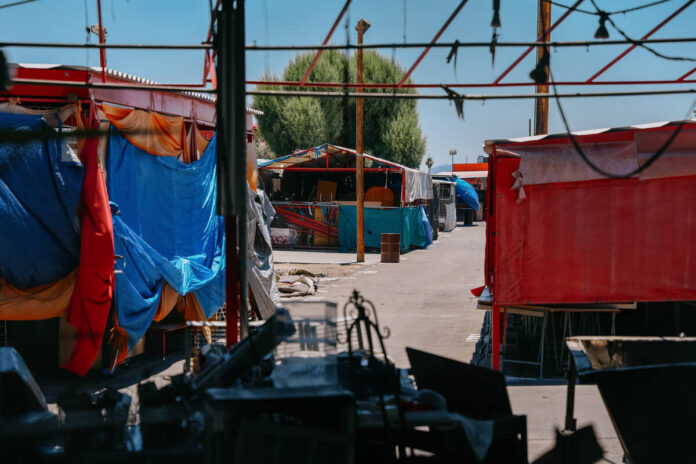The Impact of Fear on Local Latino Businesses in Las Vegas
Fear in the Undocumented Community
The recent closure of Broadacres Market has ignited a wave of anxiety across the local undocumented community in Las Vegas. This fear of being swept up by immigration agents has significantly affected the finances of independent family-owned businesses that serve the Latino population. The sentiment is palpable, echoing concerns that businesses reliant on this community face turbulent times ahead.
Declining Sales at Tutis Party Supply
Take Tutis Party Supply, where owner Edith Arteaga has been crafting handmade piñatas and offering Mexican candies since 2018. Business was booming when Arteaga first took over, managing to weather the pandemic. However, since President Donald Trump reinstituted stringent immigration enforcement measures, she reports an alarming 80 percent drop in sales. Arteaga faces the harsh reality of half-empty shelves and dwindling income, resorting to her savings just to keep the store afloat. “If there are no sales, there are no earnings,” she stated. The situation is undeniably dire, as she navigates a landscape filled with uncertainty.
Capelli Beauty Salon’s Struggles
Down the street from Tutis, Capelli Beauty Salon has seen a dramatic shift in its clientele. Owners Grecia and her husband have operated the salon for seven years, but recently, their daily foot traffic plummeted from 15 to 30 clients to a mere three or four. Construction workers who once frequented the salon now hesitate to go out, crippled by fears of immigration enforcement. With their customer base dwindling, Grecia describes the current landscape as the worst she’s seen since the pandemic.
The Aftermath of Broadacres Market Closure
The shuttering of Broadacres Market, a vital hub for local Latinos since 1977, has further fueled financial strain. The market closed unexpectedly on June 21, shortly after a high-profile immigration raid in California. While federal agents assert they did not target Broadacres, the market remains closed without a definitive reopening date, leaving countless small businesses that relied on its traffic in limbo.
Economic Impact and Elected Officials’ Responses
Local elected officials and immigration advocates are raising alarms about the economic ramifications of this heightened anxiety. They emphasize that the fear of deportation is driving consumers into hiding and keeping them away from businesses that typically cater to Latino families. There’s a growing consensus that not only is the undocumented community feeling vulnerable, but many small businesses are teetering on the brink of financial collapse.
The Nevada Republican Party stirred controversy by asserting that businesses unable to survive without the undocumented workforce did not deserve to remain open. In contrast, Democratic officials like Clark County Commission Chair Tick Segerblom profoundly acknowledged the terror gripping the community, highlighting the local officials’ efforts to monitor immigration enforcement actions in nearby regions.
Cultural Events Affected
This fear is not limited to retail and food establishments; it extends to community events as well. A recent Gold Cup soccer match featuring the Mexican national team in Las Vegas saw attendance dramatically decline, attributed to concerns over immigration enforcement. Many potential attendees expressed hesitation about the presence of immigration authorities, illustrating how fear can extend into various facets of communal life.
Uncertainty Surrounding ICE Activity
The scope of Immigration and Customs Enforcement’s (ICE) activity in Southern Nevada remains unclear, adding to the atmosphere of dread. Although some reports have surfaced about arrests in the area, data is scarce, particularly following the cessation of regular updates from the Department of Homeland Security. This lack of transparency helps perpetuate a cycle of fear and uncertainty within the community.
A Glimpse into Restaurant Struggles
Another business deeply impacted is “Tarasco Flor De Michoacan,” a family-owned restaurant serving Latino customers for 15 years. Owner Josefina Ramirez describes witnessing a profound slump in sales since March, attributing it directly to increasing visibility of immigration enforcement. As expenses continue to rise, Ramirez feels the pressure mounting. If conditions don’t improve, her business could face permanent closure, highlighting the ruthless dynamics of economic survival for small business owners caught in a politically charged environment.
The unsettling reality of economic instability for these businesses sheds light on the broader implications of immigration policies on local economies. As vendors and service providers navigate a climate thick with fear, their stories reveal the profound ways that political decisions echo through personal lives and community connections.
